Yesterday a friend sent me an interesting screen capture of an Authorship search result. I’m not sure this result is here to stay but over the course of the next day I figured out how to replicate it and learned a lot along the way.
Here’s what I found out.
Authorship Bounce
The instructions to trigger this Authorship result were to search for a specific term, click through on the first result, stay on that destination page for five or ten minutes and then use the back button to return to the SERP.
I tried this a few times without luck but … I was anxious and might have clicked the back button too quickly. So I fired it up in an incognito tab and tried to forget about it. I returned to it 20 to 30 minutes later, hit the back button and the new Authorship presentation appeared!
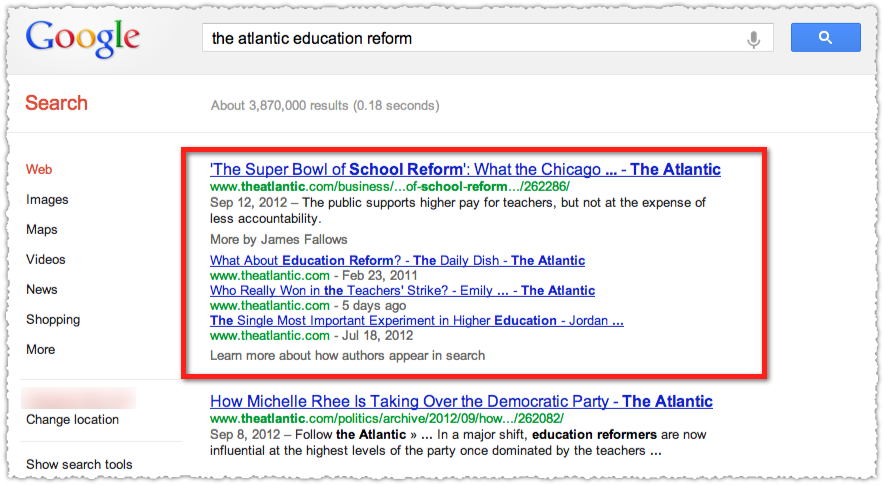
Lets be clear, the only reason Google would present these results is if they think it would improve the search experience. The signal being sent by the long dwell time is that the content (and therefore the author) was satisfying.
Now, using my handy structured data testing tool bookmarklet I found that this specific Authorship configuration was completely borked.
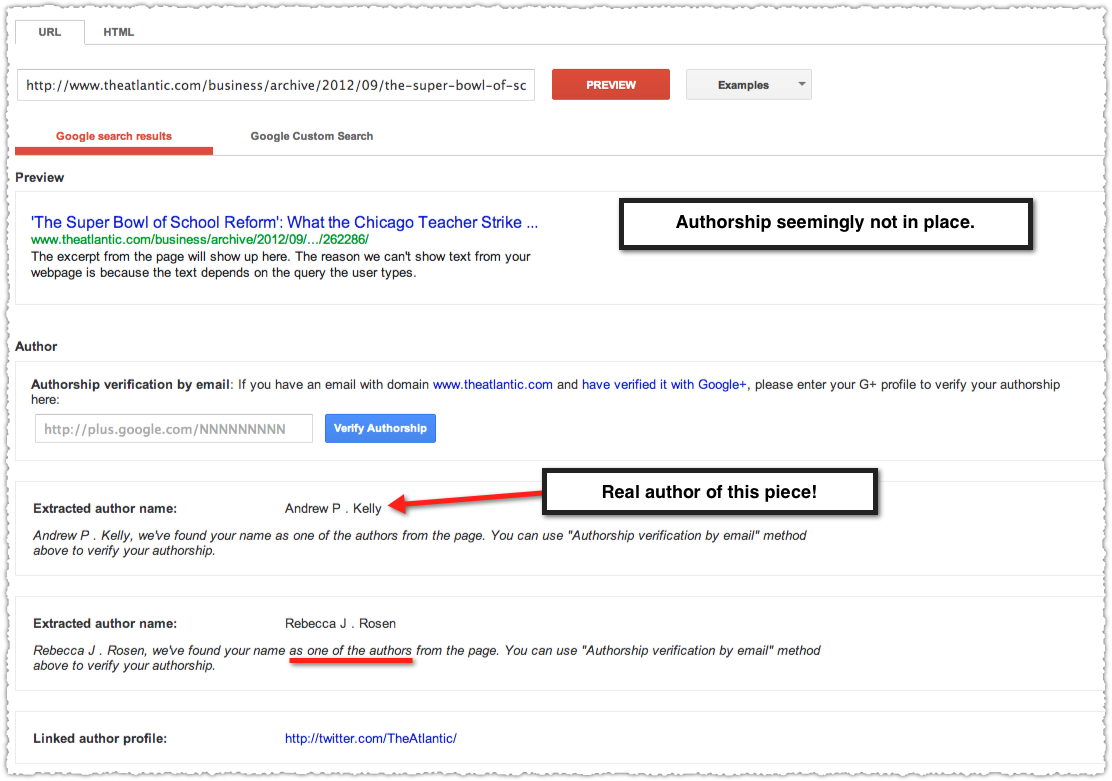
The tool tells me Authorship isn’t in place. It does however find the real author of this piece, as well as another author who is prominently displayed on the page. James Fallows does appear on the page but he is not the author of this or any of the other linked pieces.
Authorship Bounce by Publisher
So an incorrect Authorship result for a page that doesn’t validate as having Authorship in place. That was unsatisfying but I remained curious. Could I replicate this new Authorship presentation with another publisher?
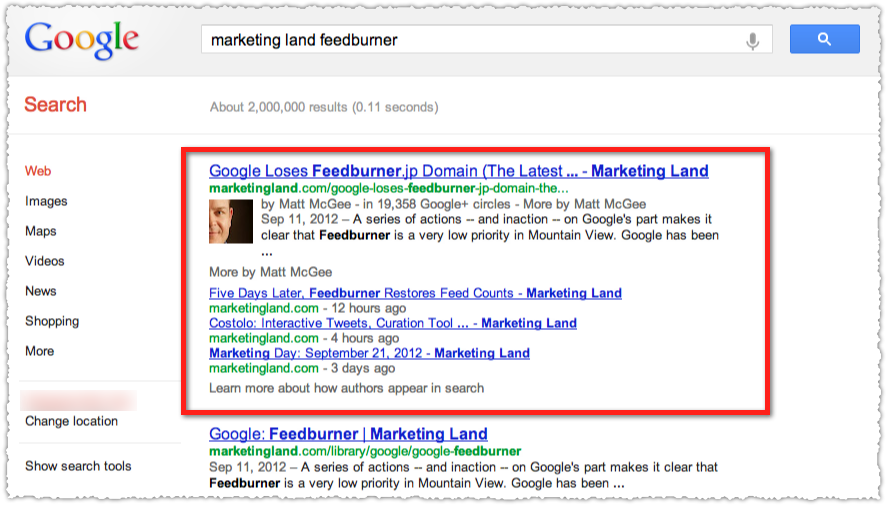
I sure could! This time I was seeing the Authorship image and all of the linked pages were actually correct and showed me more Marketing Land content from Matt McGee. Things were getting more interesting! I ran it through the structured data testing tool.
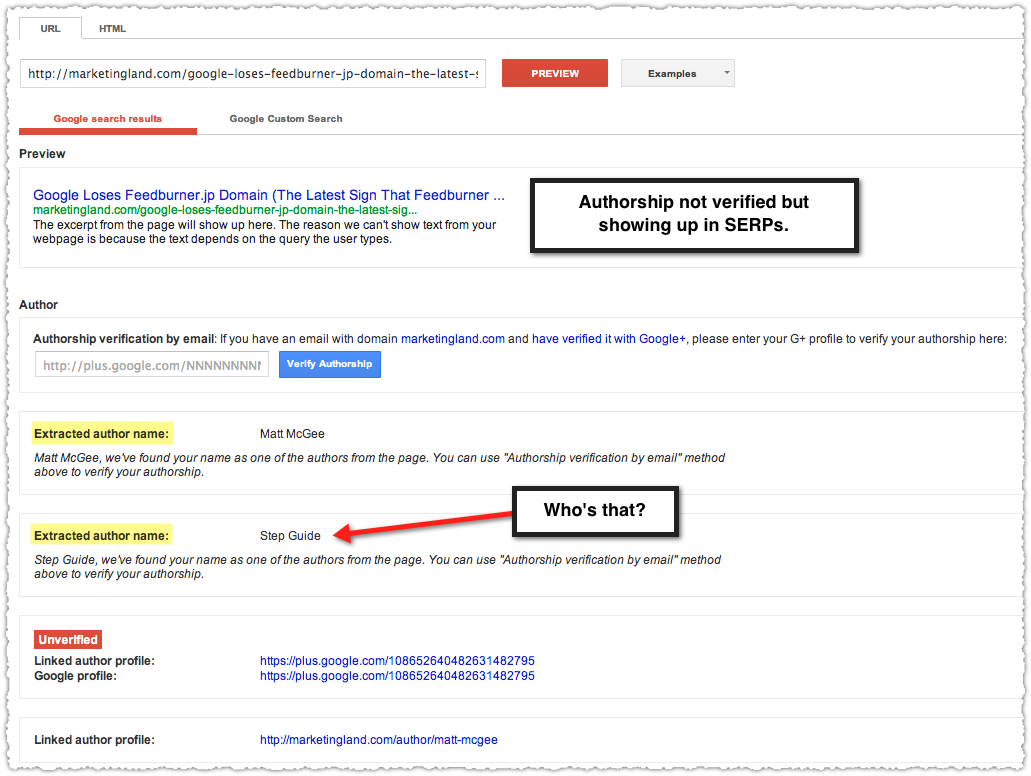
The tool actually claims that this piece of content doesn’t have Authorship attached, though clearly it does. The thing is, Matt doesn’t have Marketing Land in the Contributor to section of his Google+ profile. And I don’t believe he uses a Marketing Land email address. (I know a bit more about this because I email Matt back and forth quite a bit.)
This is just more evidence that Google is attempting to complete the verification loop for authors by looking at other attributes on the page, in other social profiles and on their Google+ profile.
For example, who is Step Guide and why are they showing up as an author on this page? Well, it’s actually pretty simple.
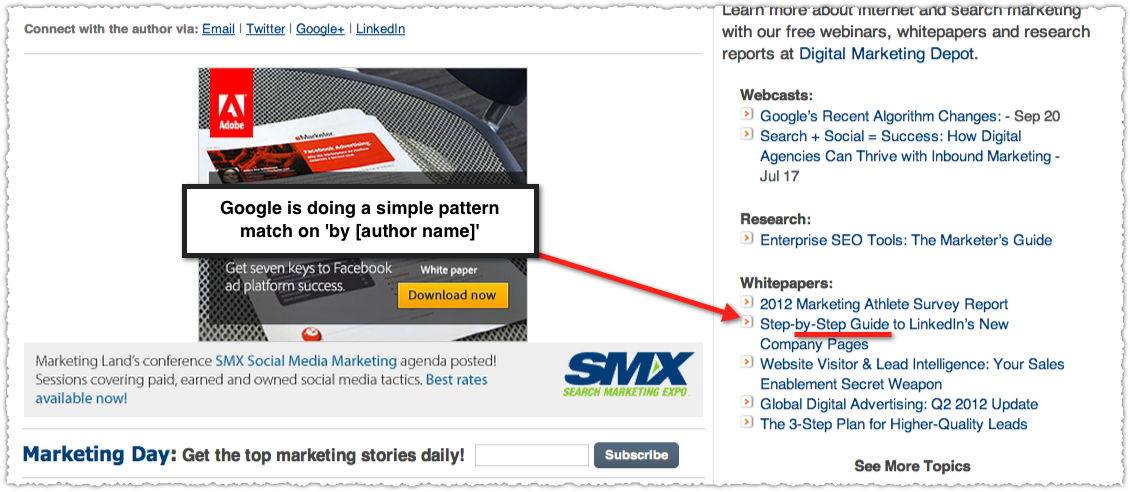
Google is trying to extract the author by using a standard byline pattern matching technique. This seems reasonable in some ways but can clearly go awry in various other ways, this being just one of them.
Authorship Bounce by Author
My next question was whether this was just on publishers or if I could trigger this result based on an author. I used myself as the guinea pig this time.
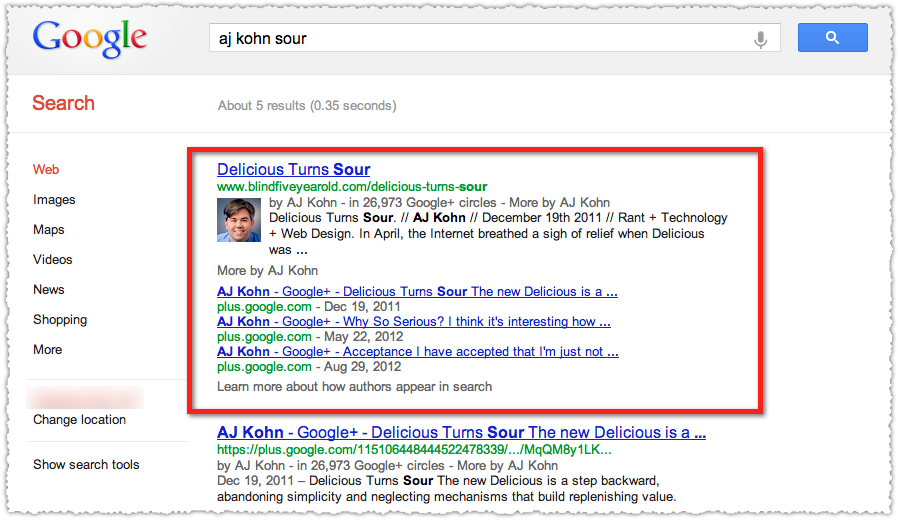
Sure enough I can get that to work too. What is really shocking here is that the other links are not to my site but to my Google+ posts. Now, that doesn’t matter too much to me, though I’m not entirely happy with the result. But larger publishers will go bat shit crazy seeing links to other properties based on their own content.
Here’s another example using an author which also shows that this presentation doesn’t only appear as the first result.
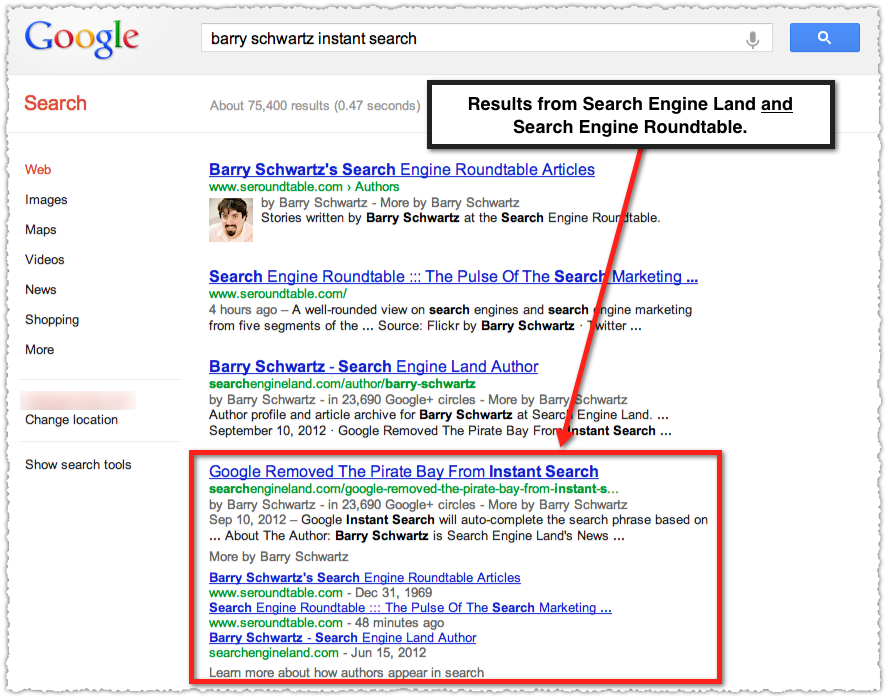
I’m sure Google would tell you that the intent of the query was the author and not the publisher. So it makes sense not to filter those Authorship results by publisher. I get and largely agree with the logic but it won’t make publishers very happy, particularly if a number of those links are going to Google+ posts.
Cue the Google is evil meme.
Authorship Bounce by Article
Now what about if I just look for a specific article? I tried this again and again and again and again but couldn’t get the new Authorship presentation to appear.
[Update] After publishing this I put out the bat signal on Google+ for more examples and Mike Arnesen (a new and intelligent voice in the community) came through with a great one.
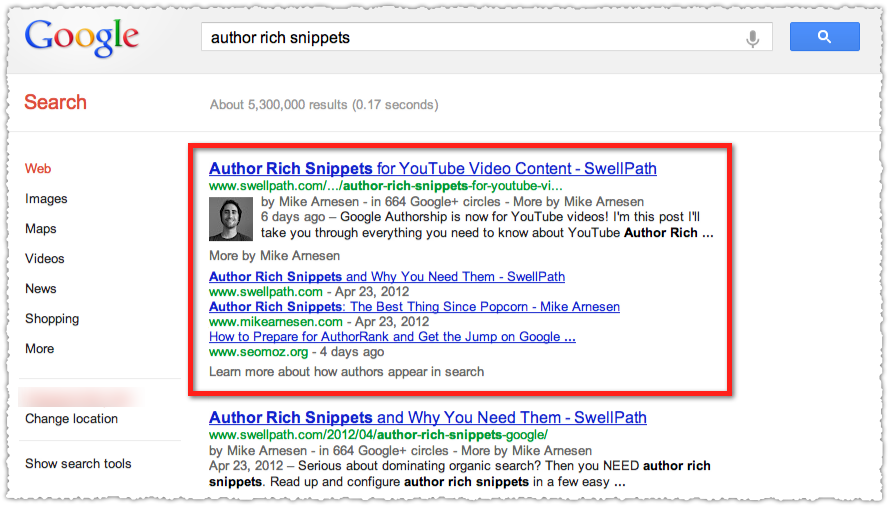
Not only is this Authorship bounce result triggered without an author or publisher but it returns two other domains outside of SwellPath. How do they feel about that?
SwellPath encourages team members to have personal blogs and guest blog on other sites. We want to see our team members’ content being promoted, even if it is not on our own site.
That’s an enlightened view, though SwellPath isn’t a typical content publisher building a business on page views.

Authorship Engagement
This new Authorship presentation shows that engagement is used as a measure of author satisfaction and may contribute to AuthorRank. That’s big news! In this case engagement is measured in the amount of time you spend on that piece of content. It confirms the importance of long clicks versus short clicks not only for Authorship but for any page and site.
The use of dwell time as a proxy for engagement and satisfaction may also point to problems with using more obvious social signals such as +1s. The latter might not indicate true authority but simple popularity. I’ve been concerned about how Google might untangle these two concepts. Here I see a glimmer of promise that content that is simply perceived as valuable because of the source or author will be discounted.
This also shows why bounce rate is a lousy optimization metric out of the box. The real danger is pogosticking and even then I can think of many instances where this metric would lose fidelity. If you’re going to use bounce rate you have to modify that measure in Google Analytics. I recommend you read this, this and this to get you started.
Long story short, getting people to actually read your content is important.
Authors Are Entities
The fact that I can’t get this result to trigger unless there is a publisher or author in the query is telling. Both authors and publishers are entities and Google can clearly associate the two when they see fit.
It seems like an easy step to roll-up the AuthorRank of contributing authors to the publisher level, allowing Google to assign the domain a new type of quality metric. Authorship is creating new dynamics in the author and publisher relationship and this new Authorship bounce presentation should only increase the tension between the two.
Who needs who more?
Extracted Authorship
The adoption of Authorship has been mixed with some studies showing a substantial amount of adoption and others the opposite. The increasing use of extracted authorship tells me two things.
First, that Google isn’t satisfied with the adoption rate and second, they’re still eager to increase adoption and use Authorship as a signal. Why else would they bother trying to do all of these connection gymnastics?
This is further bolstered by the new Authorship Project emails many have been receiving, which I believe is tied to the new Rich Snippets Structured Data Testing Tool.
Multi-Author Pages?

There’s also a subtle takeaway from the structured data results. The phrase ‘as one of the authors’ appears in the extracted author name. This seems to indicate that Google is gearing up for having more than one author attached to a page. This is in line with the original Agent Rank patent and would make sense if a Google commenting product were released.
Testing 1-9-4
It pains me to say this but the structured data testing tool can’t be trusted. Or at least it can’t be when it comes to Authorship. The new UX and name hasn’t changed the janky results it returns.
While this might be related to the many ways in which Google is trying to complete the loop without author intervention it creates a fair amount of confusion for Authorship evangelizers and likely reduces adoption rates.
This makes me sad. Please fix this Google.
TL;DR
The new Authorship bounce presentation shows that engagement is used as a measure of author satisfaction and may contribute to AuthorRank. It also debunks bounce rate signal claims, sheds light on entity relationships and exposes weaknesses in the structured data testing tool.
The Next Post: Keyword Match Ratio
The Previous Post: Content Recall

25 trackbacks/pingbacks
Comments About Reading May Influence AuthorRank
// 26 comments so far.
Paige C. Willey // September 25th 2012
This is complicated stuff. It seems like Google hasn’t quite figured everything out yet. It will be interesting to see how this evolves. This is really interesting stuff. Thanks for sharing. I hope you’ll do a follow up in a couple months.
AJ Kohn // September 25th 2012
Agreed Paige. It is pretty complex and Google’s still trying to figure out how it’ll all work.
I’m not sure exactly how it will wind up being implemented or when, but the attention Authorship continues to receive from Google leads me to believe that it will eventually become a reality.
Takeshi // September 25th 2012
Good job finding this result, I’ve never noticed it before. Very interesting to see concrete proof that Google tracks these metrics.
I wonder if the opposite effect of what you found is true– if a lot of people click on your articles, and then immediately bounce back to Google, will it lower your author rank? May be a new form of negative SEO.
AJ Kohn // September 25th 2012
I didn’t notice it until a friend tipped me off to it. But it is great confirmation that Google tracks and uses these metrics in a positive way.
Google does likely look at pogosticking behavior in some way as you describe. But you’d have to match that up with the vertical and clickstream data to use it effectively. For instance, you often visit multiple sites when researching health conditions. Many of the visits further down in the clickstream are ‘confirmation’ visits, essentially getting second and third opinions or reinforcing the opinion of the first. Those really shouldn’t count negatively against that site.
But, in general, pogosticking probably is a bad sign of quality and value. As for negative SEO, I think it would be difficult to pull off. You’d have to overwhelm the site with short-clicks from multiple IPs with a variety of queries that had a connection to previous query history.
M.-J. Taylor // September 26th 2012
Not only does Google find this complicated, but I do. 😉 I do appreciate people like you who take the time to understand and test and then explain it to the rest of us.
Nancy E. Wigal // September 27th 2012
I am advising a large regional newspaper on incorporating Google Authorship, so I will pass this onto the person who’s spearheading the implementation. Very interesting results. They will like having more links to each reporter. Thanks for sharing!
Scott // September 27th 2012
A great finding. I too have been watching and analyzing these metrics as I applied them to many sites…
Interesting that Google offers up more “author” results only when you use the browser back button. Wondering when “author” results will be displayed on subsequent Google SERPS after visiting a recognized authors page???
AJ Kohn // September 27th 2012
Yes Scott! That is absolutely the next step in this process. Right now it only happens on a bounce back but if I continually read stuff (meaning really read it based on dwell time) from an author this presentation could become the default for me.
Author personalization based on reading behavior.
Jim Rudnick // September 27th 2012
Yup….about 3 minutes it took to show more articles by the same author as you noted….validates this to me in an empirical sense….
So thanks AJ…now if only my clients will listen….
🙂
Jim
Matthew // September 27th 2012
I stumbled upon this by accident a few days ago and couldn’t figure out how to replicate it – thought I was seeing things! It reminded me of the “Block all ______ results” that happens after quick bounces. Thanks so much for the detailed post and explanation!
Makes perfect sense why Google would implement such a change and I’m actually looking forward to seeing the impact it has! 😀
– Matthew
Deepali // September 28th 2012
Very interesting, I believe I have to reread the Bill Slwaski’s post on Agent Rank Patent.
Yann Faurie // September 29th 2012
It’s all very interesting but one thing springs to my mind along the reading : will author rank follow the filter/personalization bubble ?
I mean, as AJ Kohn stated it “this presentation could become the default for me.” But then, if I find YOUR posts clever and want to read more of your thoughts, I can already bookmark your site, subscribe to your RSS feeds… I don’t need Google to show more links because I’m aleady aware of your writings…
What do you think ?
Lewis LaLanne // October 01st 2012
I plead ignorance. About 95% of this post is over my head. I’m fine with this because I’m fine with the idea that I don’t know everything and I’m open to learning.
What I do know with 100% certainty is that I’m head over heels in love with the double rainbow “What Does It Mean !?!” image you posted here. Hahaha
What’s weird is that I looked that video up a couple of weeks and laughed at it again. It’s cool to see you have a similar sense of humor. 🙂
AJ Kohn // October 03rd 2012
Lewis,
Thanks for your comment. It’s all about learning isn’t it? As long as you’re open to learning – and laughing – good things tend to happen.
Gareth James // October 06th 2012
I was playing with this last night, I was testing the time on site to trigger the ‘more by’. It was being triggered quicky when I went to more than 1 page on site then back. G using pageview engagement metrics OR time to trigger the ‘more by’.
AJ Kohn // October 24th 2012
Interesting Gareth. So your test indicates that depth of visit might also be used to trigger this presentation. That warrants some further investigation.
Guillermo Ortiz // October 07th 2012
This is amazing stuff. Who knows how many other tiny tests Google is running to determine author satisfaction. Things are definitely pointing towards gaining author rank. Great post.
Matt Coffy // October 07th 2012
We just started experimenting with the authorship tags and building it into a major part of our strategy. I believe Google is on the warpath to dig deeper into the process of the “connection gymnastics (as you said)” that Facebook’s 1 billion and growing strong relationship based world has already become. Relevancy is key to true engagement and there’s along way to go down this road for Google to play catch up.
AJ Kohn // October 24th 2012
Thanks for the comment Matt.
I think there’s less of a gap between Google and Facebook when it comes to relationships. Google may actually have better demographics on some users (though multiple sources versus self-reported) and can track what people say versus what people do. Mind you, Facebook is getting closer to the latter, particularly with EdgeRank but the click-stream of users (both search and browsing) provides huge insight into real behavior.
Gail Gardner // October 29th 2012
AJ, Do you know how opening links in a new tab affect this? If someone does a search and then opens multiple results in different tabs I suspect this doesn’t work.
AJ Kohn // October 30th 2012
Gail,
That is correct. Opening up links in a new tab disables this feature. However, I suspect that those doing this are in the vast minority.
Dexter // October 31st 2012
This post really cleared the smoke and unveiled the true nature behind Author Rank. Life without Google + is a huge mistake. Google is forcing internet marketers to make them the next Facebook or else. Google’s new Author Rank is the cornerstone of the plot, and guess what… this will work if you plan on ranking well in the future.
So, we must be prepared to scrap the crap, and only put quality content on any and all platforms.
Andre Buxey // November 09th 2012
Hi AJ,
Sorry for the self promotion but i wrote (re-wrote) an easy 3 step process for Google Authorship.
Very simple to do and makes things far easier than the tedious checklist Google gives for the authorship.
AJ Kohn // November 09th 2012
Andre,
I’m aware of the method you describe but I don’t like that it attaches authorship to every page. To me if you’re comfortable enough to open up your theme and place something in your you can go the extra steps and implement Authorship as I describe.
Brent Nau // December 06th 2012
I was discussing how to claim authorship on a old blog that I did not have access to in a Google Webmaster Hangout and John Mueller mentioned that you did not need to worry as Google is using bylines to figure out who to attribute the Author Rank to. As an extra precaution I added the old blog URL as a contribution link on my personal G+ account to help associate the posts to me.
Siegfried // March 19th 2013
well, I think now is the era of self regulating web: user enters search query and gets serps. he clicks on something, doesnt like the content and bounces – the target page loses some points. he clicks another one and reads it, then follow one of the links – the target page get some points and move up in ranking…. this is how it works now my friends 😉
best regards!
Sorry, comments for this entry are closed at this time.
You can follow any responses to this entry via its RSS comments feed.